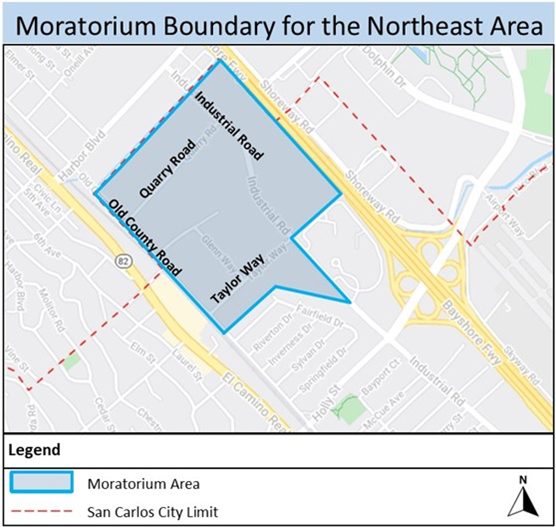Pending Specific Plan Will Streamline CEQA Review of Future Life Science Projects
On April 25th, the City of San Carlos enacted a development moratorium covering approximately 120 acres of land in the north side of the City, and east of Old County Road (see map below). San Carlos has seen significant life science and R&D development in recent years, and the northeast area is anticipated to see an expansion of those uses. The moratorium is broad, applying to virtually all development applications other than tenant improvements and projects with complete, filed applications. It is expected to be in effect for two years while the City prepares a Specific Plan that will guide future development, articulate the public benefits future projects will provide, and streamline CEQA review of projects consistent with the Specific Plan.
State law allows a City Council or County Board of Supervisors to enact a development moratorium of up to two years after it makes findings that approving projects would create an immediate threat to the public health, safety, or welfare. The moratorium is initially limited to 45 days but can be extended with another vote of the City Council or Board of Supervisors to a maximum of up to two years. Both the vote to enact the moratorium and the vote to extend must be approved by a supermajority (i.e., 4/5ths) vote.
The San Carlos City Council found development in the northeast area would have health, safety, and welfare impacts unless the Specific Plan considered how it would affect the “supply of land and adequate sites suitable, feasible, and available for the development of housing.” The findings anticipate that the Specific Plan will “develop policies and strategies to incorporate housing as a part of this new development.”
While not expected, it is possible the City Council will carve out additional projects when it considers whether to extend the moratorium. Several project sponsors opposed the enactment of the moratorium at the meeting on April 25, urging the Council to exempt projects with applications pending even if those applications were not yet complete. At least one Council member appeared sympathetic to those arguments during the May 25th meeting (as noted above, at least four of the five Council members would need to vote to extend the moratorium). Planning Department staff will hold a public meeting with stakeholders on May 11th to gather stakeholder input and that input will be shared with the Council.
Planning Department staff emphasized at the April 25th hearing that the Environmental Impact Report (EIR) the City is preparing for the Specific Plan will help streamline the approval of future projects that are consistent with the Plan. State law provides several CEQA streamlining tools for projects consistent with a specific plan analyzed with an EIR. Development under Redwood City’s Downtown Precise Plan (DTPP) provides a good example of the advantages of this approach for both the City and the applicable project sponsors. Projects consistent with the DTPP required little to no additional project-specific CEQA review, allowing them to move through the approval process in a fraction of the time normally required. In an ideal world, this strategy allows over-stretched Planning Department staff to redirect their time from project-level CEQA review to other priorities, and project sponsors to significantly reduce the often inordinate time and cost associated with CEQA review of individual projects.
Authored by Reuben, Junius & Rose, LLP Attorney Matthew Visick.
The issues discussed in this update are not intended to be legal advice and no attorney-client relationship is established with the recipient. Readers should consult with legal counsel before relying on any of the information contained herein. Reuben, Junius & Rose, LLP is a full service real estate law firm. We specialize in land use, development and entitlement law. We also provide a wide range of transactional services, including leasing, acquisitions and sales, formation of limited liability companies and other entities, lending/workout assistance, subdivision and condominium work.



